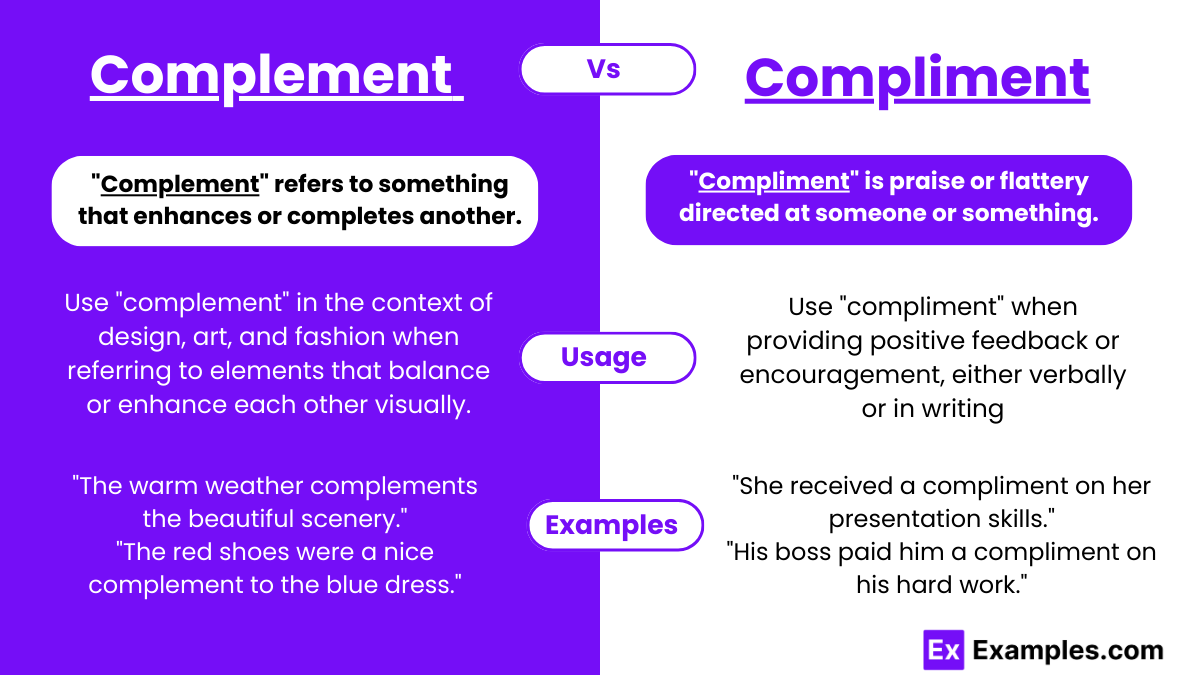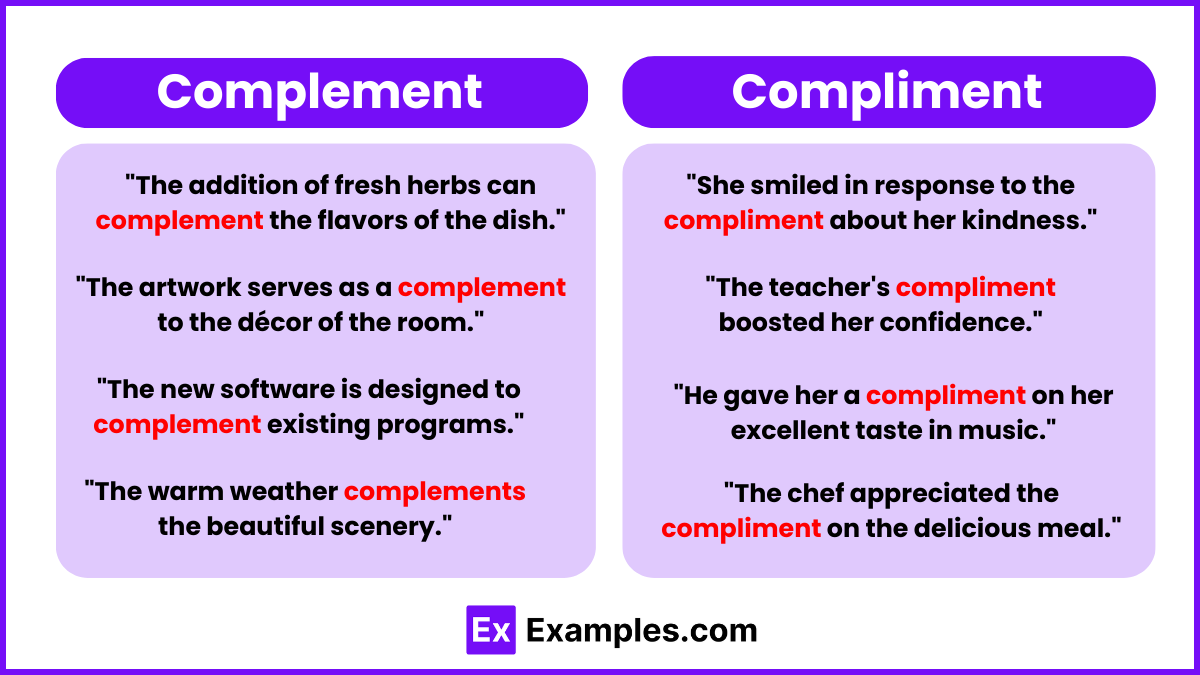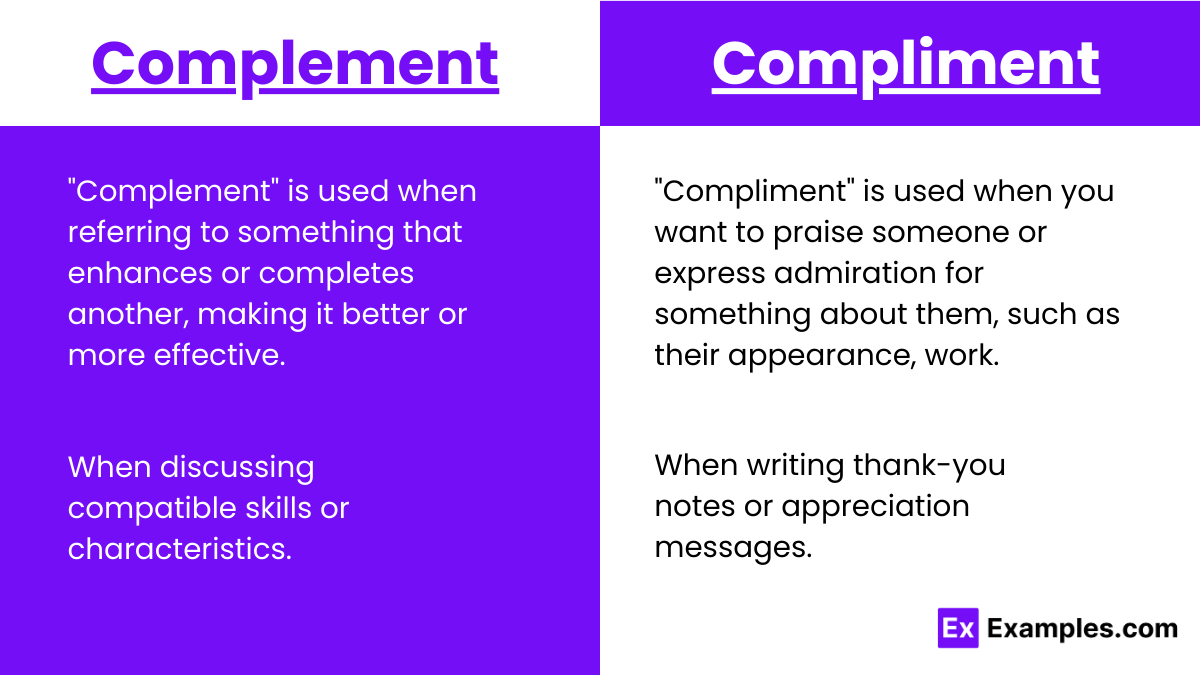Complement vs Compliment- Meaning, Differences, Examples, Usage, Tricks, PDF
The English language reveals a fascinating tapestry of words that, while sounding similar, carry distinct meanings. “Complement” and “compliment” are prime examples of such terms, often intertwined yet separate in their essence. Originating from the Latin “complēre,” meaning “to complete,” these words have carved their unique paths in the linguistic landscape. “Complement” refers to something that enhances or completes another, creating a harmonious whole. Whether it’s a piece of the puzzle that fits perfectly or an ingredient that rounds off a dish, the essence of a complement lies in its ability to bring completeness.
On the flip side, “compliment” embodies the art of admiration and approval, evolving from a journey through languages and cultures. From its Latin roots to Middle French, and then through Italian and Spanish nuances, “compliment” has come to symbolize the expression of praise and esteem. It’s the warm acknowledgment we extend to others for their achievements or appearance, a verbal bouquet that brightens days and fosters connections. While “complement” and “compliment” may often find themselves in the list of confusing words, understanding their unique origins and applications can clear the fog, making them distinct tools in our communication toolkit.
Complement and Compliment – Meanings
Complement: The term “complement” denotes an element that enhances or completes another, bringing it to a state of perfection or wholeness. It stems from the Latin “complēre,” meaning “to fill up” or “to complete.” In various contexts, a complement could be a piece that fits perfectly with another, enhancing its qualities or functions, such as colors that complement each other in art, or foods that combine well for nutritional balance. In language, it’s used to describe words or phrases that complete the meaning of a predicate, offering a fuller understanding of the subject or object involved.
Compliment: A “compliment” is an expression of praise, admiration, or flattery directed at a person, group, or entity. Originating from the same Latin root as complement, “complēre,” its meaning diverged to signify a form of social currency that acknowledges someone’s qualities, achievements, or efforts positively. Compliments are often given to express approval, enhance social bonds, or simply to make someone feel appreciated. They can be about someone’s appearance, skills, work, or any attribute that is deemed worthy of positive recognition, playing a crucial role in interpersonal communications and relationships.
Summary
Originating from the Latin word “complēre,” which means “to complete,” both “complement” and “compliment” share a common linguistic heritage but have evolved distinct meanings. “Complement” pertains to anything that enhances or completes another by adding to its traits or features, creating a harmonious or more effective ensemble. Conversely, “compliment” has diverged to signify expressions of praise, respect, or approval, often directed towards individuals to recognize their accomplishments or appearance. These nuanced distinctions underscore the importance of context when choosing between these two terms, ensuring accurate and effective communication.
How to Pronounce Complement and Compliment
- Complement: Pronunciation: /ˈkɒmplɪmənt/ (UK), /ˈkɑːmplɪmənt/ (US). The word “complement” starts with a ‘k’ sound, followed by a short ‘o’ sound, as in “cot.” The middle syllable is like “pli” in “pliable,” and it ends with “ment,” sounding like “mənt.”
- Compliment: Pronunciation: /ˈkɒmplɪmənt/ (UK), /ˈkɑːmplɪmənt/ (US). Interestingly, “compliment” shares its pronunciation with “complement.” Despite their different meanings, they are homophones, meaning they sound the same when spoken.
Difference Between Complement and Compliment
Understanding the distinction between “complement” and “compliment” is essential for accurate communication, despite their similar pronunciation.
| Aspect | Complement | Compliment |
|---|---|---|
| Definition | Something that completes or enhances another. | An expression of praise or admiration. |
| Part of Speech | Noun, Verb | Noun, Verb |
| Usage in Sentences | “The wine is a perfect complement to the meal.” | “She received a compliment on her elegant dress.” |
| Context | Often used in design, fashion, and functionality. | Typically used in social interactions. |
| Connotation | Enhancing qualities or characteristics. | Expressing approval or appreciation. |
| Examples | Color schemes, accessories, skills. | Praise for appearance, achievements. |
| Related Phrases | “Complementary colors,” “complement each other.” | “Pay a compliment,” “complimentary words.” |
| Grammar | Can refer to a word or phrase completing a predicate. | Does not have a grammatical role like “complement.” |
| Etymology | Directly from Latin “complementum,” meaning completion. | From French and Italian, meaning to be courteous. |
| Homophones | Sounds the same as “compliment.” | Sounds the same as “complement.” |
Examples of Complement and Compliment
Examples of Complement:
- Her scarf is a great complement to her outfit.
- Fresh herbs are a perfect complement to this dish.
- His skills complement hers, making them a strong team.
- The software is a complement to the existing system.
- This wine is an excellent complement for the cheese.
Examples of Compliment:
- He received a compliment on his presentation.
- Receiving a compliment on her cooking always made her smile.
- The teacher’s compliments boosted the student’s confidence.
- “You’re very talented,” was the compliment he cherished.
- They exchanged compliments at the beginning of the meeting.
When to Use Complement and Compliment
Distinguishing “complement” from “compliment” is crucial for their appropriate usage. Below are contexts where each word is correctly employed:
Usage of Complement
- To describe something that enhances or completes another.
- In discussing pairs or sets that work well together.
- In color theory, fashion, and interior design.
- Referring to grammatical elements that complete a sentence’s meaning.
- When discussing compatible skills or characteristics.
Usage of Compliment
- When expressing praise or admiration towards someone.
- In social interactions to acknowledge someone’s achievement or appearance.
- Offering positive feedback or encouragement.
- In formal settings, to show respect or courtesy.
- When writing thank-you notes or appreciation messages.
How to Use Complement and Compliment
How to Use “Complement”:
- To Complete or Enhance: Use “complement” when referring to something that completes or enhances another, making it better or more effective. Example: “The vintage rug is a perfect complement to the modern furniture.”
- In Pairs or Sets: Apply “complement” when discussing items that work well together or are often used together because they enhance each other’s qualities. Example: “Salt and pepper are common complements in cooking.”
- In Design and Art: Use “complement” in the context of design, art, and fashion when referring to elements that balance or enhance each other visually. Example: “The blue cushions are a nice complement to the grey sofa.”
- In Grammar: “Complement” can be used to describe a word or phrase that completes the predicate in a sentence. Example: “In the sentence ‘She is a teacher,’ ‘a teacher’ is the complement of ‘is.'”
- Skills and Abilities: Use “complement” when referring to skills, abilities, or functions that enhance and work well with each other. Example: “Her analytical skills complement his creative thinking in problem-solving.”
How to Use “Compliment”:
- To Praise or Express Admiration: Use “compliment” when you want to praise someone or express admiration for something about them, such as their appearance, work, or achievements. Example: “She received many compliments on her new dress at the party.”
- In Social Interactions: Apply “compliment” in social situations to express politeness, appreciation, or to make someone feel good. Example: “He complimented the chef on the delicious meal.”
- Giving Positive Feedback: Use “compliment” when providing positive feedback or encouragement, either verbally or in writing. Example: “The teacher complimented the students on their improvement.”
- To Acknowledge: Use “compliment” when acknowledging someone’s effort, contribution, or success. Example: “The manager complimented the team on completing the project ahead of schedule.”
- As a Form of Courtesy: In formal or diplomatic contexts, “compliment” can be used to show respect or courtesy. Example: “The ambassador complimented the host country on its hospitality.”
Tricks for Complement and Compliment
To distinguish between “complement” and “compliment” and remember their correct usage, consider these tricks:
- “E” is for Enhance: The “e” in “complement” can remind you that it refers to something that enhances or completes another thing. Think “E for Enhance.”
- “I” is for “I like your shoes”: The “i” in “compliment” can remind you of “I,” as in “I like your shoes,” helping you remember it’s an expression of praise or admiration.
- “Complete” in Complement: The word “complement” contains “complete,” which can help you recall that it’s about completing or enhancing something to make it whole or perfect.
- Minty Fresh Praise: Think of “compliMINT” as giving someone a “mint” for their good taste or achievement, linking the “mint” sound in “compliment” to the act of giving praise.
- Visual Association: Imagine a puzzle (complement) that becomes complete when the last piece is added, and a trophy (compliment) awarded for achievement. This visual can help differentiate the two.
Synonyms for Complement and Compliment
Here’s a table of synonyms for “Complement” and “Compliment” to help you understand their different uses and find alternative words:
| Complement (Noun/Verb) | Compliment (Noun/Verb) |
|---|---|
| Enhancement | Praise |
| Addition | Flattery |
| Completion | Admiration |
| Accompaniment | Applause |
| Supplement | Approval |
| Counterpart | Accolade |
| Match | Tribute |
| Accessory | Kudos |
| Adjunct | Recognition |
| Harmony | Endorsement |
Exercise
Fill in the blank with the correct form of “Complement and Compliment”:
- The red tie really _______ his black suit.
- She received a _______ on her excellent presentation skills.
- The sauce is a perfect _______ to the grilled fish.
- After the performance, the audience’s _______ filled the room.
- His skills _______ those of his colleagues, making the team more effective.
- I wanted to _______ the chef on the exquisite meal.
- The soft lighting in the room _______ the mood of the dinner party.
- The teacher’s _______ motivated the students to work even harder.
- The new curtains _______ the color scheme of the living room perfectly.
- He was eager to _______ his friend on her new job.
FAQs
Is Complement a Compliment?
No, “complement” is not a “compliment.” “Complement” refers to something that enhances or completes another, while a “compliment” is an expression of praise or admiration. Despite sounding similar, they serve distinct functions in language.
Can Adverbs Be Complements?
Yes, adverbs can be complements. Adverbial complements are adverbs or adverbial phrases that complete the meaning of a verb, adjective, or another adverb, providing essential information about how, when, where, or why something happens.
Is a Prepositional Phrase a Complement?
Yes, a prepositional phrase can be a complement. Prepositional phrases often function as adverbial or adjectival complements, providing additional information that completes the meaning of a sentence’s verb or adjective.
What Is the Rule of Complements?
The rule of complements in grammar is that a complement completes the meaning of a predicate. Complements can be subjects, objects, or modifiers that provide essential information to convey a complete idea in a sentence, thereby ensuring clarity and completeness.





